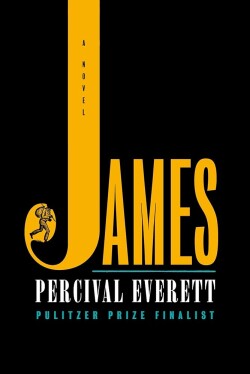Review: Percival Everett’s “James”
by Miles Raymer

Percival Everett’s James invites readers to explore a bold new retelling of Mark Twain’s classic, The Adventures of Huckleberry Finn. Written from the perspective of Jim, the runaway slave who accompanies Huck on his journey down the Mississippi River, James examines the ethics and trauma of antebellum American slavery with a literary brute force that defies its source material.
This is a challenging book for me to review. In many ways it’s the type of novel I should adore, with great prose, a smart and surprising premise, and a strong connection to classic American literature. Everett recasts Jim––or James, as he calls himself––as a sophisticated and literate man trying desperately to free himself and his family from bondage. A talented code-switcher, James toggles between “slave speech” when interacting with white people and “normal English” when speaking with other black people. He also has philosophical conversations in his head with Enlightenment figures such as John Locke and Voltaire. Everett doesn’t provide an explanation for the source of Jim’s intellectual prowess (i.e. how he learned to read and write), but as a conceit that opens up James’s inner struggle, it’s a brilliant setup.
The novel is broken up into three parts, and for the first two parts it is relatively faithful to Twain’s narrative. We are treated to James’s acerbic and clever takes on the major characters and events from Twain’s story, along with careful adjustments and additions that feel organic and expansive. The depth of James’s understanding provides delicious irony in a world where he is treated with so little regard, and his passionate search for a path to liberation is invigorating.
In its third and final part, the novel lost me. Or perhaps it’s more accurate to say that I lost the novel. Everett makes some major departures that, at least in my view, transform this tale into something entirely beyond a retelling of Twain’s original. I imagine that for many readers this shift is exciting and satisfying, but for me it was disappointing. I think my biggest obstacle was that I’ve always thought of this story as one of an unlikely friendship between Huck and Jim that propels their mutual search for freedom, and I wanted some version of that to emerge from Everett’s text. But that clearly wasn’t Everett’s project and I can respect that. There’s no doubt that James is a worthy achievement that breathes fresh relevance into an American classic, even if it didn’t deliver in the ways I had hoped.